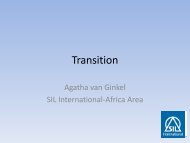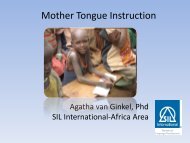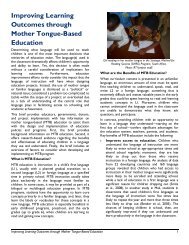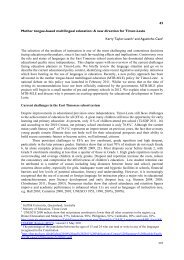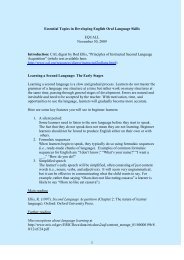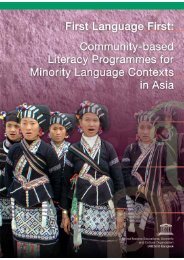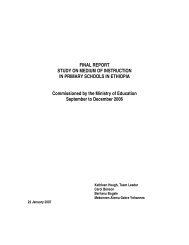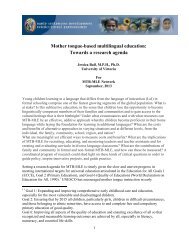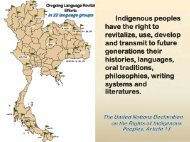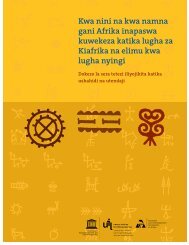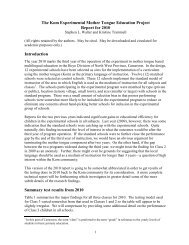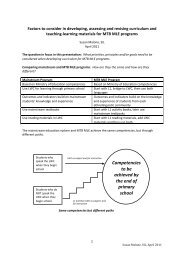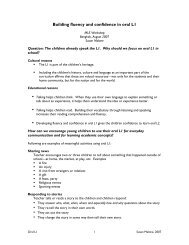Part II.pdf - MTB-MLE Network
Part II.pdf - MTB-MLE Network
Part II.pdf - MTB-MLE Network
You also want an ePaper? Increase the reach of your titles
YUMPU automatically turns print PDFs into web optimized ePapers that Google loves.
Thai people so that they will be able to adjust to world trends and events while maintaining their<br />
Thai identity, as well as desirable characteristics like virtue, competency, happiness and self-reliance.<br />
According to the National Education Act, it also enables the Thai people to embrace lifelong learning<br />
through all types and levels of education, and through the transfer of learning outcomes. Education<br />
provision will be based on 3 principles: 1) lifelong education for all, 2) participation by all segments<br />
of society, and 3) continuous development of the bodies of knowledge and the learning process.<br />
Education will be provided in three types: formal, non-formal, and informal education.<br />
Formal education provides 2 levels of education; basic education and higher education.<br />
Basic education is provided before higher education covering pre-primary, 6-years of primary<br />
education, 3-years of lower secondary education, and 3-years of upper secondary education. Basic<br />
education can be provided by early childhood development institutions, schools and learning centres.<br />
Non-formal education has more flexibility than formal education in determining the aims, modalities,<br />
management procedures, duration, assessment and evaluation conditional to its completion. The<br />
contents and curricula for non-formal education can be adjusted to meet the needs of individual<br />
groups of learners.<br />
Informal education enables learners to learn by themselves according to their interests, potential,<br />
readiness and the opportunities available from individuals, society, environment, media or other<br />
sources of knowledge.<br />
The Office of Non-Formal Education Commission (ONFEC), the new name of the Department<br />
of Non-Formal Education (DNFE) after education reform, is the new body directly responsible for<br />
the promotion and development of adult education. It aims to organize non-formal education for<br />
the disadvantaged all over the country. There are various NFE organizations established throughout<br />
the country, namely regional NFE centres, provincial NFE centres, district NFE centres and Bangkok<br />
Metropolis NFE centres, respectively, to help provide basic education, vocational skills training<br />
and information services for the out-of-school population all over the country. With its policies on<br />
development of:<br />
• Basic education involving literacy promotion, basic education equivalency programmes<br />
and continuing education based on the needs of the target groups<br />
• Education for occupational development<br />
• Education for life skills development<br />
• Education for community and social development – The ONFEC can provide non-formal<br />
and informal education to cover a wide range of disadvantaged groups based on their<br />
rights as stated in the Constitution. They are, for example, prison inmates, the disabled,<br />
the aged, ethnic minority groups, i.e. the hilltribes, Thai Muslims in the south, unreached<br />
groups of people in remote areas and Thai people living in foreign countries who have<br />
the right to learn as those within the country.<br />
197



